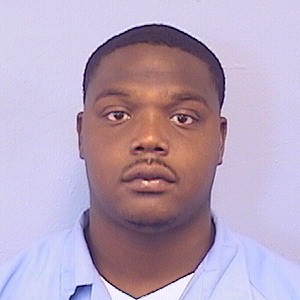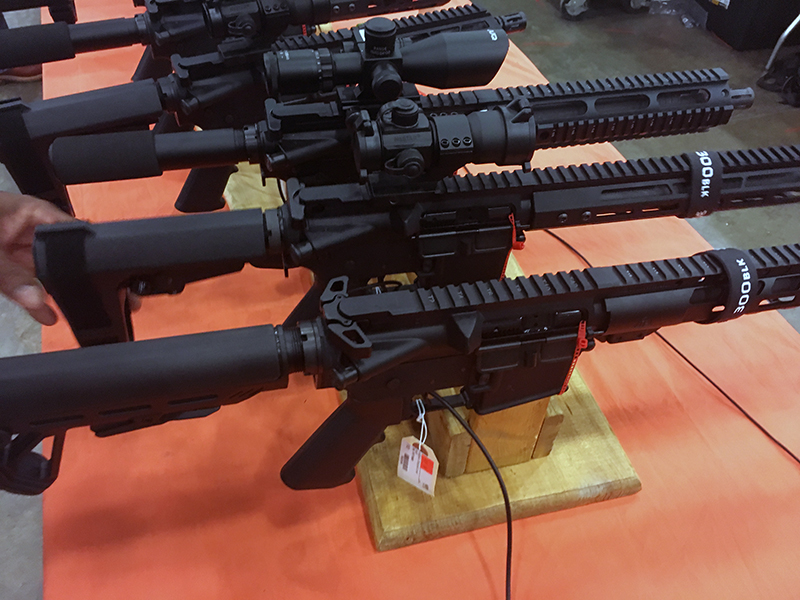For close to seven years, a Mississippi man bought firearms in and around Natchez before sending them to contacts in Chicago, many of them family members he grew up with.
Once there, the weapons would find their way to the streets of some of the city’s most violence-plagued communities and be used in homicides, shootings and other crimes.
In one case, in 2014, a bullet struck college freshman Malcolm Stuckey in the back of the head, killing him, as he tried to flee two known gang members. The 19-year-old, an honors student with no criminal record, was attending a birthday party, according to the Chicago Tribune. Two men were charged with murder. Only one, Michael Wade, 28, went to prison. Wade was convicted of aggravated battery with a firearm and sentenced to 28 years and an additional 12 years for backing out of a deal to testify against his co-defendant, records show.

Michael Wade
When police recovered the weapons, it led them back to Jonathan Smalley, 32, a resident of the southwest Mississippi city of Natchez.
Smalley, who does not have a federal firearms license, bought a total of 32 firearms in the Natchez area between May 18, 2009, and May 12, 2016, according to federal court documents.
Phone records show Smalley reached out to his contacts in Chicago after purchase and sent pictures of the guns and the U.S. Postal Service receipts that guaranteed their delivery.
The Dixie pipeline
Smalley's case is just one example of many of the deadly gun violence in the Windy City, said Chicago officials and federal officials — some of them with undercover expertise. So far this year, 320 people have been killed in Chicago, 44 fewer than this time a year ago.
More illegal guns consistently wind up on the streets of Chicago and are recovered than in any other major city. About 60% of all recovered guns come from outside Illinois, according to a Gun Trace Report conducted by the city of Chicago, its police department and the University of Chicago Crime Lab. A large number of them come from Mississippi.
[Related: Top 10 States of Origins for Guns Used in Chicago Crimes]
Federal court documents going back years spell out the inner workings of the gun trade between the two locations, where gun traffickers "conspire" to illegally buy firearms in pawn shops and gun stores in Mississippi and transport them to Chicagoans, many of whom are known gang members.
“It is self-evident that the availability of illegally circulated firearms in Chicago is directly connected to its deadly street violence,” the report concluded.
About 5% of all recovered guns in the Chicago area from 2013 to 2016, referred to as crime guns, were traced back to Mississippi, according to the report.
Mississippi — almost the entire length of Illinois and two states away from Chicago — is about 600 miles away from the state line.
Yet the report found more guns come from the Magnolia State than any other Southern state: 756 from 2013 to 2016, the third most of any state.
[Related: Scarred By Chicago Gun Violence, Student Finds Refuge, Purpose in Mississippi]
[Related: Scarred By Gang Violence, Greenwood Residents Rally to Rescue City’s Youth]
That's more than the entire state of Wisconsin (599) just north of Chicago and more than double that of Kentucky and Tennessee, both north of Mississippi and with similarly lax gun laws.
And from 2001 to 2012, of the more than 15,000 guns police traced from just outside Chicago, almost a third — 4,296 — came from Mississippi.
On the other hand, just 10 of the 3,343 guns recovered in Mississippi in 2017 came from Illinois, according to the Bureau of Alcohol, Tobacco, Firearms and Explosives (ATF). The most were in the state's largest city, Jackson.
How the guns get to Chicago
A majority of the recovered Chicago guns, about 95%, come from straw purchasers, according to the Chicago report, where a gun is bought by someone besides the actual owner.
Most gun traffickers make the trip from Mississippi to Chicago, or vice versa, by car, using I-55 as a gun pipeline. The road, which stretches from Chicago to New Orleans, passes through Memphis, Tenn., before crossing the Mississippi state line.
As a result, a significant number of gun purchases occur in the state's most northernmost towns, off I-55 just past the state border.
[Related: Types of Guns Recovered from Chicago (2013-16)]
One example is a federal case in 2007 that traced more than 100 guns back to federally licensed dealers in the northern Delta towns of Clarksdale and Tunica.
Court documents detailed how the gun traffickers operated, revealing an organizational structure in which firearms "brokers" from Chicago arranged to have guns purchased in Mississippi and brought to gang members in and around Chicago. The brokers worked with traffickers who recruited straw purchasers to buy the guns at Mississippi pawn shops and gun shops.
The straw purchasers falsely claimed ownership for the guns on federal forms, knowing the guns were being purchased on behalf of "co-conspirators" who intended to transport them to Chicago, according to court records.
In many cases, the records say, the straw purchasers knew the firearms were to be sold to members of various Chicago street gangs, and in an effort to avoid detection by law enforcement, the conspirators tried to remove the serial numbers from many of the firearms.
Why Mississippi?
The answer lies in the migration patterns of Mississippi residents, the state's permissive gun laws and the connection between major Chicago gangs and their affiliates in Mississippi.
The central conclusion of the Chicago report: "Not surprisingly, it is the very states with the least restrictive gun laws that are the sources of the guns coming into Chicago and being used to commit crimes."
Mississippi has some of the most permissive gun laws in the country, making it an attractive and potentially profitable place for gun runners.
[Related: City of Origin: Firearms Recovered in Mississippi]
In addition to allowing open carry without a permit, there is no requirement for firearm registration or background checks on private firearm sales. The latter is known as the gun show loophole, although the law refers more to who sells the gun than where it is sold.

Photos by Justin Vicory
Juan Cloy, a former undercover agent with the FBI, said it’s difficult to determine where guns purchased in Mississippi come from due to the state’s permissive gun laws.
Mississippi also doesn't have a gun registry, which would require gun owners to register their weapons. That makes tracking firearms that make it to the illegal market difficult, said Juan Cloy, a former undercover agent and firearms instructor in Mississippi.
Cloy, who tracked gun traffickers, said state laws made his job more difficult. "In some cases, we have no idea where these guns come from and who owns them, used to own them, anything. We have less information on these guns than you'd have on a car," he said.
"So, even when we suspect someone is trafficking guns, even if we pull them over and find dozens of weapons, there's almost nothing we can do."

Some of the items in high demand at a gun show in Jackson, Miss., are pistols that are equipped with several accessories — such as a high-capacity magazine — making them similar to short rifles, but without the same federal regulations.
Great Migration
For 40 years, Mississippians — especially African Americans — have sought a better fortune up North.
Between 1940 and 1980, the state’s population grew by 1 million yet the number of native-born residents only increased by 60,000 in that 40-year stretch, according to a New York Times study.
The reason?
Black Mississippians moved to the North, with a majority to Chicago. The Great Migration stemmed from a demand for factory workers during the world wars, a time that also coincided with the state's entrenched segregationist practices. Combined, it was a good enough reason for the state's black residents to flee the state's segregated neighborhoods and schools.
By 1980, about 8% of the total Mississippi population moved to Illinois, according to the Times study. This resulted in hundreds of thousands of familial connections between the two states.
A “vast majority” of illegally used or possessed firearms are obtained through an offender's social network, family or other personal connections, a 2015 survey of Cook County Jail inmates found.
“Only 60 percent of those firearms were actually purchased for cash, the remaining 40 percent were traded, shared or temporarily loaned to the offender, sometimes due to the fact that the gun was previously used in a crime,” according to the Chicago Gun Trace Report.
Taken together, the high number of familial connections between Chicago and Mississippi residents, and the ease with which guns can be acquired in Mississippi, has made gun trafficking more common between the two locations than from any other Southern state.
“It has to do with racial segregation in the South and opportunities in the North,” said Supervisory Special Agent Joe Waller, Trafficking Group, Chicago Field Division of the ATF.
“What this means in the world of firearm trafficking is that there are still a lot of family ties between Mississippi and Chicago, and we generally look for those family connections when we see Mississippi firearms recovered in Chicago.”
Gang migration
Chicago, according to the city’s Crime Commission, has more gang members (150,000) than any other city in the U.S. Some of its most prominent gangs have deep roots in Mississippi.
The Gangster Disciples, Vice Lords and the Simon City Royals, the state’s three largest street gangs, were all originally established in Chicago.
In many cases, the highly organized Chicago gangs sent representatives to cities across the country to establish a presence, not unlike a corporation sending a salesperson to cover a sales territory. Over the years, some gang members were locked up and recruited members in the state's jails and prisons. Mississippi’s Department of Public Safety found in a statewide gang assessment that about 32% of all inmates in jails and prisons are active gang members. In other cases, some gangs developed organically as families who moved up North during the Great Migration may have moved back.
There’s a nexus between them, even if they don't communicate with one another on a frequent basis, said Cloy, who once infiltrated a prominent Mississippi and Chicago gang as an undercover agent for the FBI.
“They operate independently for the most part. But when it comes to organized crime, especially gun trafficking, they’ll work together for the benefit of one another,” he said.
For more information on Youth Gun Violence Prevention, go to JJIE Resource Hub | Youth Gun Violence Prevention
Gang activity also appears to be spreading to juveniles. In 2017, more than 400 juvenile gang members passed through the Youth Court of Mississippi’s Hinds County, its most populous county, in 2017, according to a study.
Within a two-year period, more than 400 juvenile gang members passed through the Hinds County Youth Court, according to a study released by the Mississippi Analysis and Information Center.
Smalley, who grew up on Chicago’s South Side, moved to Mississippi, where he graduated from high school and attended the University of Southern Mississippi. His brothers, meanwhile, had returned to the Chicago neighborhood where they grew up and joined gangs.
Before his sentencing in a federal court in Chicago, Smalley's attorney suggested his client provided the guns out of a sense of obligation to provide protection to his brothers.
But as court records indicate, many of those guns quickly turned up at crime scenes — including five shootings in addition to Stuckey’s killing.
The gun used to kill Stuckey was linked to a second shooting a few days later. A year later, police found the weapon after a street stop of another known gang member, the Tribune reported.
Additionally, prosecutors pointed to text messages between Smalley and his brother as evidence Smalley knew what the guns were being used for.
In one exchange, Smalley’s brother said: “OK and I shot somebody he ain’t dead doe.”
Smalley replied: “Don’t text it. Call me later.”
The judge sentenced him to 5½ years in prison. He is housed at a federal prison in Beaumont, Texas, and scheduled for release in 2023.
Craig Fries, a special agent with the Chicago division of the ATF, referred to Smalley's involvement in gun trafficking as “particularly troublesome in this city, at this time.”
With help from Mississippi, it shows little signs of slowing.
This story was produced in conjunction with the Juvenile Justice Information Exchange and published with the Mississippi Center for Investigative Reporting and the Clarion Ledger. It is part of the JJIE’s project on targeting gun violence. Support is provided by The Kendeda Fund. The JJIE is solely responsible for the content and maintains editorial independence.
